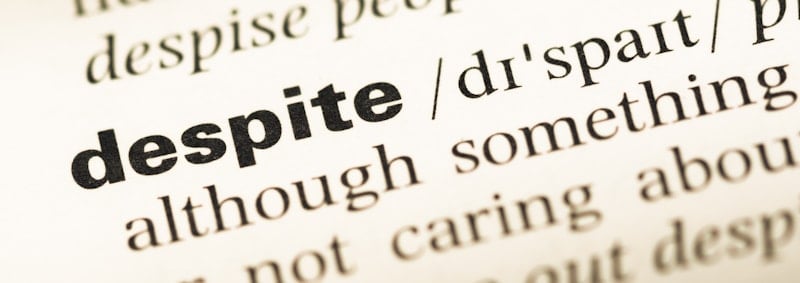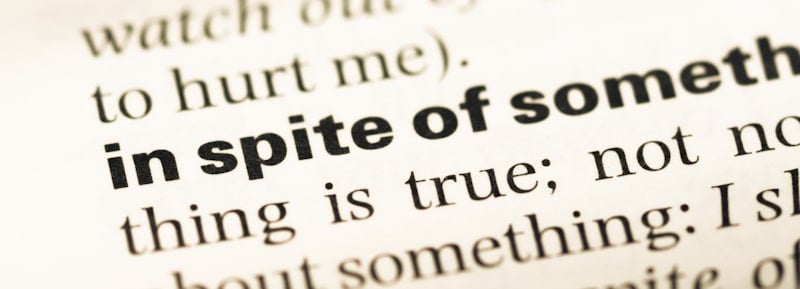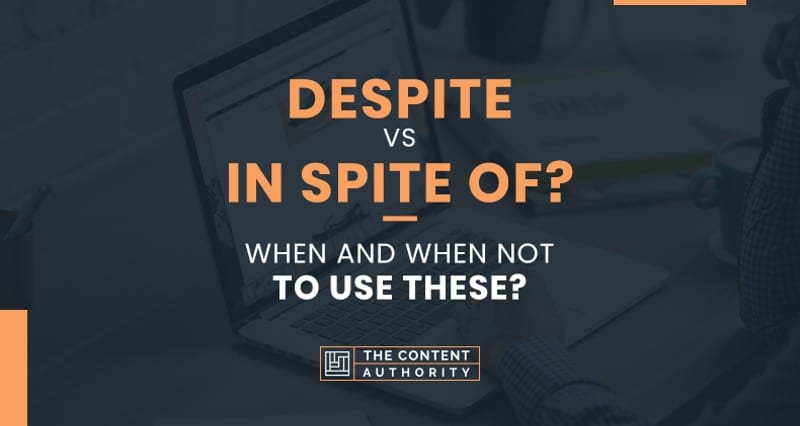The English language has words and phrases with similar and also identical meanings. If you like precision, you will likely choose the shorter alternatives. Trying to choose between “despite” and “in spite of”, however, is more than just about brevity.
“Despite” and “in spite of” are identical in their meanings and can be used interchangeably in texts. Both are typically used in writings when the subject is “rebelling” or “disregarding the norm” or “not paying heed to prevalent conditions”. The contexts of the phrases may, however, vary.
There is a very thin line differentiating “despite” and “in spite of” and, for most writers, that line is non-existent. If you think otherwise and would like to dig for more information, read on.
Getting to Know “Despite” and “In Spite Of”

“Despite” and “in spite of” mean the same and can be used in place of another. The two prepositional expressions denote a sense of contrast or link contrasting ideas. They usually get used at the beginning or somewhere in the middle of a sentence, but rarely at the end.
The two expressions are quite similar in meaning to “even though” and “although”. A few other phrases that can be used alternatively with them are “notwithstanding”, “regardless of”, “in defiance of”, etc.
The noun “spite”, common to both the terms, means “hatred or ill will toward another, accompanied by the disposition to annoy, irritate, or thwart”. An alternative phrase for it is “holding a grudge”.
The word “spite” also works as a verb, which could mean “to annoy or hurt purposely”. For example:
- Do not spite him. He is just a kid.
- I hit her in her face to spite her.
In the above sentences, the word “spite” means “to hurt”.
Using the Prepositions “Despite” and “In Spite Of” in Writings
The word “spite”, as mentioned above, means “to hurt or annoy”. However, the prepositional phrases being discussed here aren’t that “spiteful”. However, in specific writing scenarios, a waft of contempt could be felt courtesy of the two expressions. For example:
- Mary ate the ice cream in spite of her mother’s warnings.
In the above sentence, “in spite of” implies “regardless of”. However, though not explicitly stated, it could also mean Mary holds a minor grudge against her mom for not letting her eat the ice cream.
Here is another sentence comparing the usage of the two prepositions:
- Despite her leg pain, she finished the marathon.
In the sentence above, you may use “in spite of” in place of “despite”. However, the former could come across as a tad formal and elaborate. The word “despite” isn’t a casual conversational term by any means, but it’s certainly not as fancy.
Not to mention, both “despite” and “in spite of” are more widely used in writings than in oral communications.
Using “Despite” and “In Spite Of” with Other Words or Word Types
Both “despite” and “in spite of” use a noun, pronoun, or a gerund right after. The following are sentences illustrating the same:
- The flight was late by two hours. In spite of the delay, we arrived at the venue on time.
- Despite experiencing a severe headache, she had a wonderful birthday.
It is also quite common to use the phrase “the fact that” with “despite” and “in spite of”. For example:
- Despite the fact that she studied very hard, she couldn’t top her exams.
- In spite of the fact that she studied very hard, she couldn’t top her exams.
The clause “that”, however, is never used by itself after “despite” and “in spite of”.
“Despite” and “in spite of” should never be followed by a noun clause as they’re not conjunctions. As mentioned earlier, the prepositional phrases should always be followed by a noun phrase or noun.
The following are incorrect ways to use the two expressions:
- Several middle-class folks discovered that they cannot access quality medical attention, in spite of they needed it badly.
- Moreover, this is the very first evidence exhibiting that VNP and ANP exert varied effects in fish in spite of they sharing the same receptor.
In the aforementioned sentences, “in spite of” can be replaced with “despite”, but the sentences will still be grammatically wrong.

The Thin Line Between “Despite” and “In Spite Of”
The decision to use “despite” instead of “in spite of” or the other way around may not be incorrect, but it certainly implies a subtle meaning shift. In other words, there is a slight “desire to irritate” or “rebellion” connotation with “in spite of”. And it is closer in meaning to the word “spite” than “despite”.
For example, “She went to the club late in the night in spite of her parents warning her against it.” In the sentence, it can be perceived as if the subject didn’t care about the warnings she was issued by her parents and acted “rebel-like”.
Comparatively, “despite” does not typically share the “desire to irritate or annoy someone”. It’s used in contexts where actions are taken regardless of the odds not being in favor of the person or activity. The battle here is more against the given scenario than a particular person.
“Despite” should be used when the focus is more on the decision instead of the motivating factor behind the move. In the sentence above, “despite” doesn’t fit well if the objective is to imply the subject is a “rebel”.
- She went to the club late in the night despite her parents warning her against it.
Using “despite”, as in the sentence above, indicates the subject considered her parents’ warnings but still went ahead because she believed there was no looming fear, or she felt it was worth the risk after all.
In other words, the subject thought about her parents’ warnings and went ahead after analyzing the situation herself. The sentence with “in spite of”, on the other hand, indicates the subject didn’t care what her parents thought and went ahead primarily because she got a kick from not obeying her parents.
This subtle difference in primary and secondary meanings, however, may not be accepted by all, with most sidelining the same as “individual interpretations”.
On a related note, in this idiom “in spite of oneself”, the preposition “in spite of” cannot be replaced with “despite”, as in “despite oneself”.
Difference Between “Despite” and “Despite Of”
In almost all sentences, “despite” can be replaced with “in spite of” and vice versa. That level of interchangeability, however, may not exist between “despite” and “despite of”. That, however, doesn’t indicate “despite of” is an incorrect term or phrase.
The difference between the two could come down to contemporary usage. Compared to “despite of”, “despite” is a lot more commonly used, which could give the wrong impression that “despite of” is a grammatically incorrect phrase. In other words, the “despite of” phrase can be found more in classic literature.
If you do end up using “despite of” instead of “despite” or “in spite of” in your texts and someone points that out, save face by saying you were heavily influenced by Shakespeare’s writings.
Irrespective of how archaic or modern your writing style is, there are instances when “despite of” should not be used instead of “despite”, like in the following sentence, for example:
- Marie is a wonderful assistant, despite her minimal computer skills.
The common notion that “despite” should not be followed by the preposition “of” is wrong. Therefore, if you come across the phrase “despite of” in writings or conversations, do not assume it’s a grammatical error just because the phrase is used less commonly.
P.S. Unlike “despite” having “despite of”, “in spite of” has no “inspite”.
Example Sentences with “Despite”
The following are sentences with the term “despite” in them:
- She was finding it difficult to converse in German despite having lived in the country for five years.
- We lost the match, despite all the hard work put in during practice.
- She enjoyed the festival despite the heavy downpour.
- Despite all her wealth, she doesn’t live in a fancy house.
- She refused to give up despite all the obstacles.
- He lived and died poor despite having worked hard all his life.
- Despite all the personal setbacks, she never stops being optimistic about life.
- He couldn’t understand a thing, despite her detailed explanations.
- Tom’s business is doing quite well despite the economy.
In the above sentences, the preposition “despite” could or may not be replaced with “in spite of”. It all depends on how the sentence reads and sounds after the exchange of prepositions.
Example Sentences with “In Spite Of”
Here are a few sentences with the phrase “in spite of”:
- I love him and will marry him in spite of his tainted past.
- They never made a lot of moolah, in spite of being relatively successful.
- I cannot even imagine not liking her in spite of her several faults.
- She went to school that day in spite of her right leg pain.
- In spite of the insults, she maintained her cool.
- My dad is always in a cheerful mode in spite of his bad health.
- He responded, in spite of his resolve.
Conclusion

The prepositional phrases “despite” and “in spite of” have almost identical meanings. Perhaps the only thing that differentiates them is what the two expressions connote in specific writing contexts. And, as mentioned before, adding the preposition “of” to “despite”, as in “despite of”, could change the meaning of the phrase or sentence it’s used in.
Shawn Manaher is the founder and CEO of The Content Authority. He’s one part content manager, one part writing ninja organizer, and two parts leader of top content creators. You don’t even want to know what he calls pancakes.

